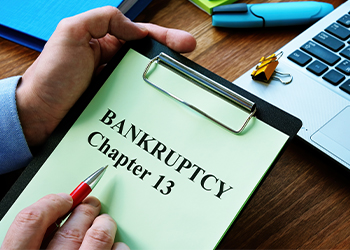How Do Courts Determine Good Faith in Chapter 13 Repayment Plans?
April 24, 2025
 Chapter 13 bankruptcy can help individuals restructure and repay their debts while retaining their property. However, to successfully complete Chapter 13 bankruptcy, you will need exhibit good faith with your repayment plan.
Chapter 13 bankruptcy can help individuals restructure and repay their debts while retaining their property. However, to successfully complete Chapter 13 bankruptcy, you will need exhibit good faith with your repayment plan.
Courts mandate that all proposed repayment plans demonstrate good faith, serving to protect creditors and confirm the debtor’s genuine commitment to fulfilling their financial obligations. But how do courts determine whether your repayment plan fits the bill?
At Vivona Pandurangi, PLC, our attorneys have years of experience guiding clients seamlessly through the Chapter 13 bankruptcy process across Virginia, including Falls Church, Alexandria, Arlington, Fairfax, Manassas, Prince William, and Loudoun. Here, we aim to help you understand what good faith is in Chapter 13 bankruptcy and how the courts assess good faith.
What is Good Faith in Chapter 13 Bankruptcy?
Good faith reflects a sincere commitment to meeting your financial obligations to the best of your ability. A Chapter 13 repayment plan must be submitted in good faith to reflect your honest effort to repay creditors based on your income and financial situation.
Chapter 13 claims can be thrown out by the court if they are filed without genuine good faith. Courts want bankruptcy to serve as a tool for legitimate financial recovery, not as a loophole for exploiting debt.
Factors Courts Consider to Assess Good Faith
When evaluating whether a proposed Chapter 13 bankruptcy repayment plan is submitted in good faith, the courts look at several factors. Since no single factor determines the outcome, the judge will weigh the overall circumstances of each case. Some of the primary considerations the courts will use to assess good faith include the following.
Accuracy and Transparency in Disclosures
Accurate financial disclosures are essential for creating trust and demonstrating good faith. The courts will closely review your income, expenses, debt obligations, and property valuations to determine whether your representations are accurate and transparent. Overstating your expenses or attempting to under report your income can raise red flags.
Reasonable Effort to Repay Creditors
Chapter 13 doesn’t require you to repay every penny owed. However, the repayment plan must demonstrate a legitimate effort to repay creditors within your means. For example, you must offer to contribute all disposable income toward repayment and structure your repayment plan to maximize creditor repayment while still accounting for your basic living expenses.
Nature of Debt and How It Accumulated
The judge will evaluate the types of debts included in your bankruptcy and assess the circumstances under which they were incurred. For example, did you accumulate significant credit card debt right before filing? Courts are particularly cautious about cases that suggest excessive spending or attempts to manipulate the system.
Compliance with Legal Requirements
Your proposed repayment plan must comply with the procedural rules of Chapter 13 bankruptcy law. This includes making payments on time and adhering to the repayment period set by the court. Any deviations could be seen as a lack of effort to follow through.
Past Bankruptcy Filings or Conduct
If you've filed for bankruptcy in the past, this can influence how the court evaluates your good faith. Multiple filings within a short time frame may suggest an attempt to abuse the protections of bankruptcy laws.
Virginia Laws on Bankruptcy and Good Faith
Virginia law follows federal bankruptcy guidelines under the U.S. Bankruptcy Code, but the state also follows specific rules relevant to Chapter 13 filings. Some of the important considerations for Virginia residents filing for bankruptcy include:
Income eligibility: Under Chapter 13, you must meet certain income thresholds to propose a repayment plan. Virginia's median household income figures (adjusted annually) play a role in determining eligibility.
Exemptions: Virginia allows specific bankruptcy exemptions for personal property, retirement accounts, and more under the Code of Virginia § 34-4. These exemptions can influence how courts assess your financial disclosures and repayment capacity.
State homestead exemption: Virginia’s homestead exemption provides limited protections for homes included in bankruptcy filings. Courts will consider whether protected assets are used fairly when reviewing good faith.
Plan feasibility: Judges apply Virginia-specific bankruptcy precedent when reviewing the feasibility of your repayment plan. Demonstrating reliable income and a realistic budget strengthens the perception of good faith.
How to Improve the Likelihood of Court Approval
If you’re waiting for court approval for your Chapter 13 bankruptcy plan, it's important to plan ahead and be as transparent as possible. Some proactive steps you can take to boost your plan’s chances of approval include the following:
Detailed documentation: Work with your attorney to document every aspect of your financial situation, from income down to every itemized expense.
Maximize creditor repayments: Include a repayment structure that demonstrates genuine efforts to pay back as much debt as possible without jeopardizing essential living costs.
Address potential concerns in advance: Discuss potential issues, such as recent spending habits or unusual debt accumulation, with your lawyer early. This allows them to address concerns proactively and provide effective solutions upfront.
Stay consistent: Once you’ve proposed your plan, make all payments promptly and meet all conditions consistently throughout the repayment period.
Filing for bankruptcy may provide debt relief, but your case's outcome and long-term financial recovery will depend on proving to the court that you've approached the process responsibly.
Chapter 13 Bankruptcy Attorneys Serving Falls Church and Alexandria
Filing for bankruptcy can be a useful tool for those dealing with overwhelming debt. If you or someone you know is considering filing for Chapter 13 bankruptcy, it's important to understand the concept of "good faith" and work with an attorney who can guide you through the process.
At Vivona Pandurangi, PLC, we are experienced in helping our clients manage their debt through bankruptcy. Located in Falls Church and Alexandria, Virginia, we provide accessible and skilled legal counsel to clients throughout Arlington, Fairfax, Manassas, Prince William, and Loudoun. Contact us today to schedule a free consultation.
